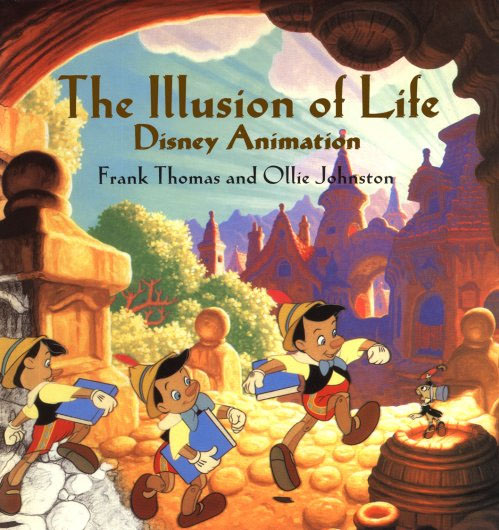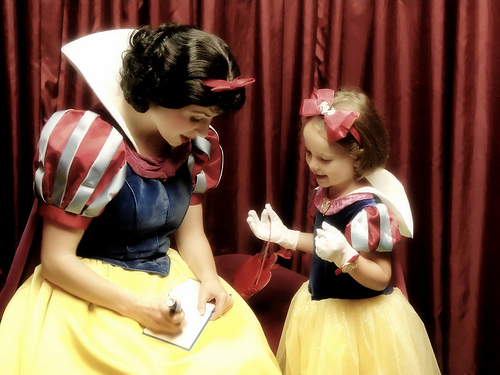Walt Disney films are largely responsible for my interest in making movies. I’m not afraid to admit that. I couldn’t say that in college. I was too preoccupied with what my classmates and professors thought of me. Back then I was more likely to talk about Citizen Kane and Stanley Kubrick films. Those are masterfully crafted movies, sure, but they had practically zero influence on my aspirations. Not so with Walt Disney’s creations, but in my effort to matter to the world I had forgotten that.
It’s taken me a while, but I have slowly returned to the things that I loved for their own sake and not based on what other people said. Reading The Illusion of Life, a marvellous book about the story of Disney animation lovingly told by two early Disney animators, Frank Thomas and Ollie Johnston, helped me to restore my unashamed enthusiasm for many of the Disney animated films I grew up with as a kid.

The first film I remember seeing in the theater was Snow White. Pinocchio was the first film that compelled me to stay up late and ponder its mysteries, in this case I was trying to figure out what it would feel like to get transformed into a jackass. (A few years later, I would understand the jackass thing all too well, unfortunately. I’m working on getting things right these days, but it’s a process.)
During the holidays, going to a Walt Disney film became a tradition for my family. It was a time when we’d stop fighting with each other and informally agree to be temporarily harmonious. It was a nice time. But moving on, my interest in computer animation too was colored by my exposure to the Pixar films that Disney distributed.
Not everyone in my world had a similar admiration of Walt Disney. My college professors carefully avoided any reference to Disney’s influence on cinema history, although the man pioneered new techniques for working with sound and color and had won twenty-six Oscars before he died. (For all you film kids doing the math at home, that’s a few more than the nine Oscars that Stanley Kubrick’s films won.) It is also worth pointing out that while Hollywood was still years away from conceiving of the effects film, Walt Disney gave the world Snow White, the first movie in which every single frame featured a created effect.
One of the books I had to read in college was Simulacra and Simulation by Jean Baudrillard. He wrote several long and loveless paragraphs about how Disneyland was the ultimate example of our false and simulated existence.
Baudrillard’s book was a joyless thing, perfumed with important-sounding philosophical concepts. I don’t remember much from the book beyond an impression that Baudrillard wanted to convince me that he was smart and very well read, and that his work anticipated the Matrix films (films that I enjoy much more than Baudrillard’s book).
For comparison, let’s look at how The Illusion of Life discusses Disney’s accomplishments. In the book, Walt is quoted as saying “I am interested in entertaining people, in bringing pleasure, particularly laughter, to others, rather than being concerned with expressing myself with obscure creative impressions.” Did you notice the emphasis on serving others in that quote?
That’s a lesson that the book’s writers, Frank Thomas and Ollie Johnston, absorbed well. Consider their advice to aspiring entertainers: “The ancient counsel ‘Know thyself’ is full of wisdom, but, for the entertainer, it is possibly just as wise to suggest, ‘Know your audience.’

photo from flickr.com/expressmonorail
What a contrast with Baudrillard’s style that is. Disney’s work has brought a sense of joy and wonder to millions of people around the world. Jean Baudrillard has filled the minds of philosophy students with intellectual contempt and a sense of superiority over the uninformed.
I know that the Walt Disney Company is a very powerful multi-national corporation, and I don’t celebrate everything that the company does, but I’m talking about the man who started it all, the man who lived up to his well-known quote: “We don’t make movies to make money, we make money to make more movies.” I tend to root for the philosophers, but in this case Baudrillard comes off as the more banal and corporate one.
To delight in a thing for the sake of the thing itself and not for the potential profit it brings is an essential aspect of being less corporate. If you can’t tell that the writers of The Illusion of Life created the book out of a deep, delighted love for animation and for Walt Disney, then you probably can’t recognize love when you see it. There’s the cover that transitions gracefully from black and white to color, the textured yellow paper that greets you when you open the book, the full-page color stills that appear in the first few pages, and the playful, yet thorough, prose.
All of these things are clues that this is a book that cares very much about getting the details right. The book has 489 colored prints, thousands of black-and-white drawings, and it was printed in Italy; that’s definitely not the way to produce a book if you care only about maximizing your profits and keeping costs low.
On top of that, there are several flip-book sequences on the top-right corners of the pages that beg for your attention. I would have still bought the book without that feature, a feature that must have taken a bit of time to sync up, but how magnificent to discover one more extra that Frank and Ollie threw in for us.

photo from flickr.com/expressmonorail
The animator-writers of the book speak fondly of Walt most of the time, and they dedicated the book to him, so obviously they liked the guy. But, they don’t give him the idealized hero treatment that I’ve seen the Walt Disney Company do on occasion. Instead, the writers give us examples of when Walt was abrasive, difficult to please, and even wounding.
Look at how they critique a bonus system that Walt tried at one point: “The bonus system did not produce better pictures or even good ones. Few regulations do. Efficiency is better built through dedication rather than speed for its sake.” How refreshing that they were not afraid to discuss the strengths and the weaknesses of their boss and the man they admired.
Since Frank and Ollie are honest about Disney’s flaws, we are more likely to believe them when they sing Disney’s praises, and sing they do. They talk about Walt’s incessant curiosity and his high standards.
Walt Disney didn’t fall into the corporate trap of resisting change merely to do things like they’ve always been done, and his drive to innovate wasn’t limited to technology. For example, he didn’t hesitate to hire women for his ink and paint department, even though it was accepted knowledge at the time that only men could do the job effectively.
Nor was Disney afraid of failure. Apparently, he wanted to be a live-action director when he first came to California, but that didn’t work out so well. Instead of giving up, Disney returned to animation and worked hard to produce Oswald the Lucky Rabbit cartoons.
But, thanks to strong-arm negotiation tactics by Charles Mintz, a producer working for Universal, Disney was soon locked out of the very cartoon he helped to create. On top of that, most of his workforce was signed away from him. Disney had every reason to get bitter, but instead he stayed focused and created a character known as Mickey Mouse.

photo from flickr.com/expressmonorail
Frank and Ollie also talk about the spirit of cooperation that Disney encouraged. Everyone was expected to share knowledge and to help those who were struggling on a concept. They quote Disney as saying, “Everyone has to contribute or they become laborers,” and they give a few examples of Walt’s determination to find the right job that best suited the strengths of his people. The assumptions that everyone matters and that everyone has distinct skills are seemingly obvious, but they are still ignored in more corporate environments.
Since Disney animators helped to define the craft of animation, Frank and Ollie could have thrown around corporate phrases like “proprietary information” and “intellectual property” when discussing their animation processes. Instead, out of a desire to see their beloved field of animation advance, they broke down their technique into twelve distinct principles that are thoroughly illustrated with one example after another. Those twelve principles are now the cornerstones of all the animation training programs that I’ve seen.
By giving information away and trying to be helpful, Frank and Ollie earned for Disney the loyalty of thousands of animation students who succeeded by studying their work. Too bad more companies aren’t as generous with their resources these days, since their businesses could benefit greatly if they did. It’s the curse of the all too-powerful legal departments and of the frivolous lawsuits that make such departments necessary, I suspect.
While discussing the craft of animation Frank and Ollie write, “The animator should be as surprised as anyone at the way it comes out.” Exactly right, but that should be true for any work that isn’t corporate in nature.
You can do all the planning in the world, but you’ll never know all the conditions and the particulars that might come up until you dive into the thing. When you react to changes in the moment, your work has vitality. Otherwise it is a representation of a preconceived idea that grown distant from reality.
Think of the last corporate event you attended. Were you surprised at all when the wacky speaker made lame, self-aggrandizing jokes and then talked about how the numbers for that quarter were great news for the company, regardless of what the numbers actually looked like? That kind of speech is bad because it stays the same regardless of what happens in the world or with the audience.
Anything with vitality, whether a service, product, or person, has to be surprising at least in some sense, by definition. Otherwise, let us call the thing in question dead or corporate.

photo from flickr.com/expressmonorail
I will end with two more quotes from the book. “Our true personalities are best revealed by our reactions to change we did not expect.” Not bad insight from men who make cartoons, don’t you think?
Toward the end of the book, Frank and Ollie throw in a quote from William Faulkner. Faulker explains that it is a writer’s “privilege to help man endure by lifting his heart, by reminding him of the courage and honor and hope and pride and compassion and pity and sacrifice which have been the glory of his past.” At that point, Frank and Ollie add that “even the cartoon can try for such ideals.”
If animators aim for such lofty ideals, maybe it’s not asking too much for you to reconsider the merit of animation in general and Walt Disney in particular. Or, you could go back to reading Pretentious Quarterly and producing and endorsing things that bring more despair and decadence into the world, but don’t expect me to applaud you for that. I’ll be too busy celebrating the things that make me smile and keep me hopeful.

